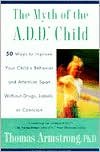List Books » The Myth of the A.D.D. Child: 50 Ways to Improve Your Child's Behavior and Attention Span without Drugs, Labels, or Coercion
Category Books
- Fiction Books & Literature
- Graphic Novels
- Horror
- Mystery & Crime
- Poetry
- Romance Books
- Science Fiction & Fantasy
- Thrillers
- Westerns
- Ages 0-2
- Ages 3-5
- Ages 6-8
- Ages 9-12
- Teens
- Children's Books
- African Americans
- Antiques & Collectibles
- Art, Architecture & Photography
- Bibles & Bible Studies
- Biography
- Business Books
- Christianity
- Computer Books & Technology Books
- Cookbooks, Food & Wine
- Crafts & Hobbies Books
- Education & Teaching
- Engineering
- Entertainment
- Foreign Languages
- Game Books
- Gay & Lesbian
- Health Books, Diet & Fitness Books
- History
- Home & Garden
- Humor Books
- Judaism & Judaica
- Law
- Medical Books
- New Age & Spirituality
- Nonfiction
- Parenting & Family
- Pets
- Philosophy
- Political Books & Current Events Books
- Psychology & Psychotherapy
- Reference
- Religion Books
- Science & Nature
- Self Improvement
- Sex & Relationships
- Social Sciences
- Sports & Adventure
- Study Guides & Test Prep
- Travel
- True Crime
- Weddings
- Women's Studies
The Myth of the A.D.D. Child: 50 Ways to Improve Your Child's Behavior and Attention Span without Drugs, Labels, or Coercion »

Authors: Thomas Armstrong
ISBN-13: 9780452275478, ISBN-10: 0452275474
Format: Paperback
Publisher: Penguin Group (USA)
Date Published: September 1997
Edition: (Non-applicable)
Author Biography: Thomas Armstrong
Book Synopsis
The Myth of the A.D.D. Child is the first book of its kind to squarely challenge the mislabeling of millions of children as A.D.D., and to question the overuse of psychoactive drugs in treating children's hyperactivity. Not long ago, children who behaved in certain ways were called "bundles of energy," "daydreamers," or "fireballs." Now they're considered "hyperactive," "distractible," or "impulsive" - victims of the ubiquitous Attention Deficit Disorder. Tragically, such labeling can follow a child through life. Worse, the medications prescribed for A.D.D. may not only be unnecessary - they could be harmful. With this in mind, Dr. Armstrong provides fifty innovative, proven, and safe ways to help a child develop lifelong internal controls. His strategies involve every aspect of a child's development, from education and cognition to biology and culture. He also includes an easy-to-follow checklist to pinpoint the interventions that are best suited for a particular child, and hundreds of resources - books and organizations - that support the fifty strategies. This provocative book offers much needed practical help to both parents and professionals.
Publishers Weekly
A psychologist and former teacher, Armstrong (Seven Kinds of Smart) offers a practical guide for parents of hyperactive, inattentive children-those often tagged as suffering from attention deficit disorder, or ADD-and argues persuasively that ``these children are not disordered.'' Asserting that the causes of ADD-type behavior are complex and may be cultural, social, psychological, educational and even biological, he suggests that the solution is not pills, but skills. He offers parents 50 specific strategies, such as providing a balanced breakfast, enrolling the child in a martial arts class, giving him or her real-life tasks, limiting TV and video time, establishing consistent rules and routines and holding family meetings for helping kids with behavior and attention-span difficulties. Many of his exercises and activities are illustrated with examples from his experience in teaching special education classes. Included are a questionnaire to aid parents in deciding which strategies will most likely benefit their children, an extensive bibliography and a caution that the book is not a substitute for medical care, but a ``supplementary educational resource.'' (Sept.)
Table of Contents
Subjects
 Special Education
Special Education  Education - Other Diseases & Disorders
Education - Other Diseases & DisordersNonfiction
 Psychology
Psychology  Psychological Disorders
Psychological DisordersNonfiction
 Psychology
Psychology  Psychology - Theory, History & Research
Psychology - Theory, History & ResearchParenting & Family
 ADD / ADHD
ADD / ADHD  Attention deficit disorder in children -> Popular works
Attention deficit disorder in children -> Popular worksParenting & Family
 Children with Special Needs
Children with Special Needs  ADD / ADHD
ADD / ADHDParenting & Family
 Children with Special Needs
Children with Special Needs  Special Needs - General & Miscellaneous
Special Needs - General & MiscellaneousParenting & Family
 Family - Assorted Topics
Family - Assorted Topics  Child Rearing & Development
Child Rearing & DevelopmentParenting & Family
 Family - Assorted Topics
Family - Assorted Topics  Parenting - Discipline
Parenting - DisciplinePsychology & Psychotherapy
 Psychology - Theory, History & Research
Psychology - Theory, History & Research  Child & Infant Psychology & Psychiatry
Child & Infant Psychology & PsychiatryMedical Books
 Psychology & Psychotherapy
Psychology & Psychotherapy  Psychology - Theory, History & Research
Psychology - Theory, History & Research
